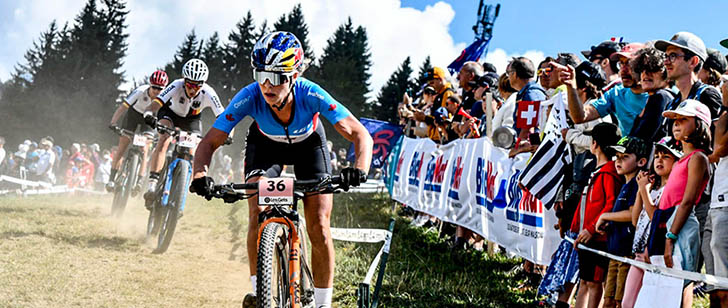March 2/09 23:10 pm - How To Start A Mountain Bicycling Club
Posted by Editor on 03/2/09
It is sometimes difficult for bicyclists to convey their experience to non-bicyclists, especially to those traditional users and established land managers with whom we interact most frequently. How does one explain that an experienced bicyclist becomes one with the bike and the land and at speeds that seem alarming to others, still appreciates the scenery, notices the wildlife, and is in fact, in control? How do we demonstrate that we are legitimate users; that we won't cause environmental damage, and that we can ride safely in multiple-use environments? How do we demonstrate that large numbers of bicyclists are an asset to the parks? The answer: we must organize.
This is a problem for mountain bicyclists, who have traditionally been less organized and more individualistic than other backcountry users. Most mountain cyclists ride alone or in small groups. It is also a fact that the logistical demands of forming an organization and meeting with members, land managers, and other user groups can take an extraordinary amount of time. Unfortunately, the alternative is often closure of the backcountry to bicycles. In most of the access situations to date, trails were closed and then mountain bicyclists got organized. We must reverse this sequence. It is extremely important that mountain bicyclists unite at the local and national levels to stem the tide of closure. If there is no organized group of mountain bikers in your area, form one. If you have a riding club, increase your trail maintenance and trail committee work. Have your club join IMBA and participate in the national movement that promotes responsible riding, trail volunteerism and open trails.
Organizing
First, you must generate membership. Put petitions or sign-up sheets in all of the local bike shops. If you do this, make sure you ask respondents to PRINT their names, full addresses and telephone numbers or you'll get hundreds of illegible and incomplete responses. Send a mailing to all of the respondents that provides an outline of your reasons for starting a club, and includes the time, date and place of your first meeting. The Post Office will sell a bulk mail permit. You must have more than 200 pieces of mail and you must sort them by postal codes according to bulk mail guidelines (available at the Post Office). Talk to your postmaster about pre-printed permit stamps. They'll save you a lot of time.
If your club has access to a computer, take the time to set up a database (membership date, name, address, phone, volunteer activities). This is extremely useful later when contacting members who have volunteered for a specific activity, who live in a specific area, or who need to renew their membership.
Contact bike shops directly. They're often able to provide mailing lists, photocopying, postage meters, meeting space, and other resources. Remember that they're in business and thus, they may want to know what you'll do for them. Remind them that there's a direct connection between their sales and the availability of local trails. Let them know that your club riders appreciate the support of dealer members and sponsors. Tell members to support (shop at) the dealers who support your club. Encourage them to participate in the education of new mountain bicyclists. Ask shops to distribute IMBA's Rules of the Trail and a membership form with every new bike sold. But be careful not to become so closely identified with a particular shop that other local retailers won't get involved.
Land Management Officials
Government land management agencies have a responsibility to serve the general public, but often serve their perceived constituencies. Bicyclists have every right to contact appointed officials to discuss trail cycling concerns. You will find that most government employees are helpful and willing to work with you. You may find that they are worried about other users' reactions to mountain bikes. Be rational and well organized. As a rule, agencies move slowly. Be prepared and be patient.
Inform your local officials that you wish to be informed of all deliberations relating to mountain biking. Be specific in requesting policy changes, and in discussing particular trails or riding areas. Ask them how your mountain bike club can help them. Also, let them know that you appreciate their work.
You may also need to get involved with elected officials. This can range from taking a politician on a ride, speaking to a politician on the street or over a meal, getting a large group of cyclists out to testify at a hearing, or even trying to influence elections.
Other User Groups
Shared use of the backcountry demands cooperation between different user groups. Sooner or later, you'll have to meet with representatives of other outdoor groups. Some members of these groups may be completely hostile to mountain bicyclists. Most members will be curious or worried about the impact of mountain biking. on their outdoor experience. Establish your legitimacy, your commonality, and your willingness to work together.
Individuals resist change and are suspicious of strangers. Try to find mountain bicyclists within the other groups and encourage them to get involved. Join the groups if it is appropriate. Work from within. Work with other groups in trail building and maintenance, political lobbying, and other environmental efforts. Show them that mountain bicyclists appreciate the backcountry for the same reasons they do, follow the IMBA Rules of the Trail and practice the Leave No Trace philosophy.
Publicity And Follow-Through
No matter how important your work or how successful your efforts, few people will know about it unless you publicize. Write letters to the editor of appropriate publications. Send press releases on activities and events, and have flyers and newsletters available at local bike shops. Don't let negative impressions of mountain bikes be publicized without a response. Talk about your mountain biking and trail access issues with other bicyclists, co-workers, friends, family, etc. After a while, others will seek you out for information.
Similarly, follow through on your contacts. Officials, groups and agencies may have expressed great interest and cooperation when you met with them. Give them a date when you'll get back to them. Ask them when you can expect action. Make inertia and momentum work with you, not against you.
Networking
There is no need for us to reinvent the wheel. Share your expertise and your materials. Many of the bike magazines list clubs and organizations. List yourselves, and make contact with others. Affiliate with IMBA and plug into the international network of trail cycling advocates.
Good luck, and if you have any questions, concerns or comments contact IMBA's Canadian office at: IMBA PO Box 23034, Kitchener, Ontario, N2B 3V1
www.imbacanada.com, canada@imba.com
| Return to Canadian Cyclist homepage | Back to Top |





